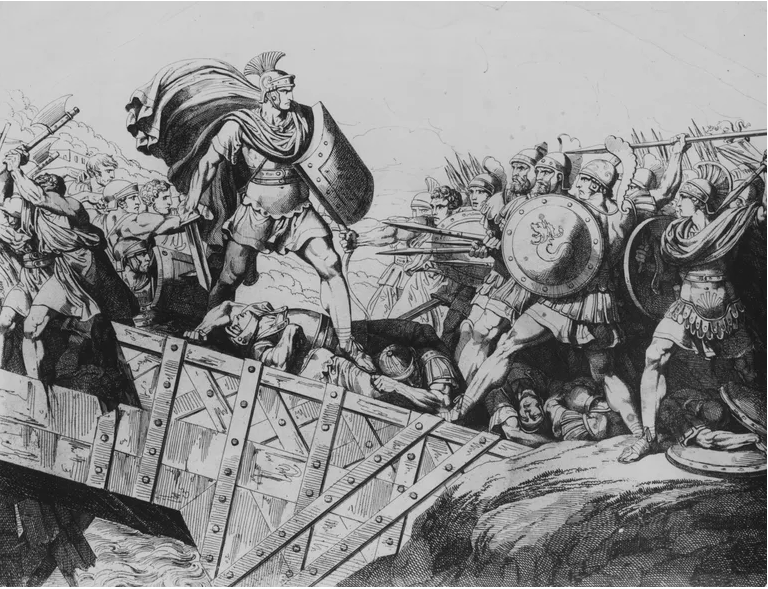Oblivion Movie Review
Then out spake brave Horatius,
The Captain of the Gate:
"To every man upon this earth
Death cometh soon or late.
And how can man die better
Than facing fearful odds,
For the ashes of his fathers,
And the temples of his Gods."
2013’s Oblivion [Amazon link] starring Tom Cruise was a movie I enjoyed at the time, and since I recently watched it again while killing time on a business trip I thought I would offer up some retrospective thoughts.

As you can see from the color scheme here, ashes are a key theme
Oblivion was one of a couple of solid science fiction movies that Tom Cruise headlined in the early 2010s, along with the movie adaption of Lee Child’s Jack Reacher. I wrote a review of Live, Die, Repeat in 2015 that focused on the way that movie borrowed from videogames to construct its narrative, and succeeded in my opinion.

Roman hero Horatius (530 - 500 BC) defending the Tiber Bridge against the army of Lars Porsena. Rischgitz/Hulton Archive/Getty Images

Jack, is that you?
Oblivion, on the other hand, borrows from American science fiction’s obsession with history, war, and the history of war. One of the key events in Oblivion is when Tom Cruise’s Jack Harper [which is what, the fourth or fifth time he’s played a Jack?] finds a tattered copy of Thomas Babington Macaulay’s The Lays of Ancient Rome.
Author Jerry Pournelle thought highly enough of Macaulay to host a complete version of The Lays on his website, where you can still find it. I believe that Jerry aspired to Macaulay’s accomplishment, joining historical instruction with moral inspiration at the pinnacle of artistic expression. Since Macaulay is still good enough to quote 180 years later, I think Jerry’s esteem is warranted.
Oblivion pays tribute to the old old tradition, of which Macaulay is a conscious transmitter, that sought to use the arts to form the moral sensibilities of the citizenry. Jack’s chance discovery of a book of poetry sends him to his destiny, to stand bravely facing fearful odds.
The way in which art, music poetry and stories, can inspire men to stoically face their own deaths is a remarkable piece of social technology. It shouldn’t be surprising that some of the most striking examples of this that we have come from the Decisive Lifetime, that period of Western history when nation-states employed social technology just like this to drive society in the service of urgent public policy.
The Decisive Lifetime runs from 1860 to 1945. The age of the great wars and of the great economic upheavals, it was the time when the lives of the nation and the state merged in order to meet public emergencies that could not have been addressed in any other way.
The Lays of Ancient Rome dates from 1842, just before the Lifetime, but Macaulay would certainly have been influential during that time. Perhaps the other most famous example of this social technology was inspired by the wreck of the H.M.S. Birkenhead in 1852, but not put into its final form until 1893 when Rudyard Kipling wrote "Soldier an' Sailor Too"
To take your chance in the thick of a rush, with firing all about,
Is nothing so bad when you've cover to 'and, an' leave an' likin' to shout;
But to stand an' be still to the Birken'ead drill is a damn tough bullet to chew,
An' they done it, the Jollies – 'Er Majesty's Jollies – soldier an' sailor too!
Their work was done when it 'adn't begun; they was younger nor me an' you;
Their choice it was plain between drownin' in 'eaps an' bein' mopped by the screw,
So they stood an' was still to the Birken'ead drill, soldier an' sailor too
Oblivion also provides us the other answer to why men fight, the only part of the movie that isn’t gray tableaus of destruction. Jack has for himself a bucolic retreat, with splashing brooks and pleasant greenery. A place for him to live in peace with his wife and child. And it goes right for the most startling contradiction that lies at the heart of this style of bravery, because this is exactly what you won’t have if you stand and be still to the Birkenhead Drill.

What Jack fights for
And yet, men will still make their last stands. The wise men and philosophers know, as well as the scriptwriters of Oblivion, that if Jack retreats to his refuge, disaster will come for him sooner or later, so if there is to be any chance at all, he must screw his courage to the sticking place and offer everything up in order that others might live.
This is one of the foundational concepts of our civilization, and I was pleased by how well this movie expressed it. The movie fans the flames of my own courage, which is as it should be. Since it is science fiction movie, it also offers up an unusual solution to the the sacrifice required to stand and be still, but I’ll let you discover that for yourself.



Comments ()